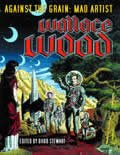Potrzebie
Friday, February 25, 2011
The Third Man Museum and Walking Tour.
On November 25, 1949, David O. Selznick sent this telegram about Anton Karas to Daniel T. O'Shea at Selznick Productions:
...Cannot commence to tell you sensation caused by Karas's zither music in The Third Man. It is rage of England and has already sold more record copies than any other record in entire history of record business in England. It is widest-played dance music in England... Ads here use "Hear Harry Lime Theme," etc. in type dwarfing all other billing. It is one of those unpredictable, tremendous sensations that I cannot expect any of you to understand who have not been here. Entirely unrelated newspaper articles and editorials, even on politics, constantly refer to it. Inevitably, this success will be repeated America if we are prepared for it. We should be able to make fortune out of this music.
Regards,
David
Labels: anton karas, selznick, welles
Sunday, July 13, 2008
Mardecortesbaja
.



These images are typical of what you can expect to find at Lloyd Fonvielle's Mardecortesbaja, one of the best visual culture sites on the Internet.



These images are typical of what you can expect to find at Lloyd Fonvielle's Mardecortesbaja, one of the best visual culture sites on the Internet.
Labels: cyd, kane, little orphan annie, welles
Saturday, May 19, 2007
Raising Orson Annie
Little Orphant Annie's come to our house to stay,
An' wash the cups an' saucers up, an' brush the crumbs away,
An' shoo the chickens off the porch, an' dust the hearth, an' sweep,
An' make the fire, an' bake the bread, an' earn her board-an'-keep
But why didn't Kael supply the Lockhart parody? In the mid-1970s I made a trip to the Boston Public Library to see if I could locate Lockhart's song, and after searching through a pile of books, I found it. I copied it down, but as years passed, the sheet I wrote on was eventually buried somewhere in my paper jungle. Recently, I decided to try again, this time doing a Google Books search. Once again, I found very few places where the lyrics were ever published, yet at last I can rescue it from obscurity. Here it is:
Little Orson Annie
Little Orson Annie's come to our house to play,
An' josh the motion pitchers up an' skeer the stars away
An' shoo the Laughtons off the lot an' build the sets an' sweep
An' wind the film an' write the talk an' earn her board-an'-keep
An' all us other acters, when our pitchur work is done,
We set around the Derby bar an' has the mostest fun,
A-list'nin' to the me-tales 'at Annie tells about,
An' the Gobblewelles 'll git YOU
Ef you DON'T WATCH OUT!
In her famed 1971 "Raising Kane" essay (originally in The New Yorker), Pauline Kael made a curious reference that stuck with me. She mentioned a 1939 song about Orson Welles by Gene Lockhart, but she did not elaborate or supply the lyrics. In a paragraph about the attitude of the film community to Welles prior to Citizen Kane (1941), she wrote:
Welles was hated in Hollywood long before he'd made a movie; he was hated almost upon his arrival. From time to time, Hollywood used to work up considerable puerile resentment against "outsiders" who dared to make movies. The scope of Welles' reputation seems to have infuriated Hollywood; it was a cultural reproach from the East, and the Hollywood people tried to protect themselves by closing ranks and making Welles a butt of their humor. Gene Lockhart composed a stupid, nasty ditty called "Little Orson Annie," which was sung at Hollywood parties; the name stuck and was used by the columnists, though Hedda Hopper supported him and suggested that Hollywood reserve judgment, and Louella Parsons, on December 31st, selected him as "the most discussed personality to come to the films in 1939."Intriguing, right? Well, obviously some sort of satirical springboard from James Whitcomb Riley's "Little Orphant Annie" (1885), still taught in schools in Indiana:
Little Orphant Annie's come to our house to stay,
An' wash the cups an' saucers up, an' brush the crumbs away,
An' shoo the chickens off the porch, an' dust the hearth, an' sweep,
An' make the fire, an' bake the bread, an' earn her board-an'-keep
But why didn't Kael supply the Lockhart parody? In the mid-1970s I made a trip to the Boston Public Library to see if I could locate Lockhart's song, and after searching through a pile of books, I found it. I copied it down, but as years passed, the sheet I wrote on was eventually buried somewhere in my paper jungle. Recently, I decided to try again, this time doing a Google Books search. Once again, I found very few places where the lyrics were ever published, yet at last I can rescue it from obscurity. Here it is:
Little Orson Annie
Little Orson Annie's come to our house to play,
An' josh the motion pitchers up an' skeer the stars away
An' shoo the Laughtons off the lot an' build the sets an' sweep
An' wind the film an' write the talk an' earn her board-an'-keep
An' all us other acters, when our pitchur work is done,
We set around the Derby bar an' has the mostest fun,
A-list'nin' to the me-tales 'at Annie tells about,
An' the Gobblewelles 'll git YOU
Ef you DON'T WATCH OUT!
-- Gene Lockhart
Labels: kael, kane, little orphan annie, welles



